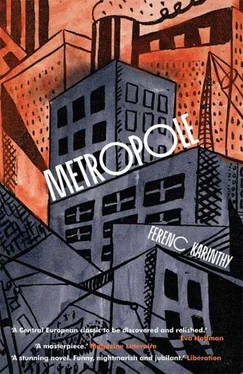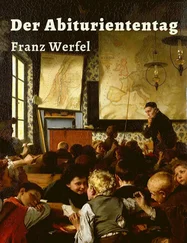If the words for yes and no exist in a language then it may be assumed that no should turn up relatively often. It is the same for how and but and and although they might be combined with other words, such as the Latin — que . He had once read that in Hungarian the most common agglutinating substantives are people, house, flat, country and so forth. But would that be the same here? And if so, how should he fish these out or sift them from the ocean of text before him? How would he be able to tell which was which?
What if he could hack his way into this jungle of language by studying the syntax? In order to do this he would have to look out for groups of characters that were similar but not identical. If, for example, the first few were similar but the latter part different, then one might assume that these were various inflexions or agglutinations.
He spent a whole day looking into this kind of thing, neatly noting down everything in columns for easier scrutiny. He found mostly those where only the first two or three elements were the same. Of course he couldn’t exclude the possibility that these were individual words, their resemblance merely coincidental, such as batter and battle , or like the English six and sister . But if they were root-words or syllables, exactly as he hoped they were, then what did the various agglutinations mean? Were they substantives, verbal inflections, formative syllables, notations, postpositions? Might they represent differences of gender as in the case of the French directeur and directrice ? It might be that what he took to be root was verbal prefix, or the first term of an agglutination comprising several parts. Or indeed much else.
If, however, the last syllable matched — for he did come across some in his enquiries that did — it was possible to image that these were different words with one kind of inflection. In Hungarian, for example, there were szobában (in the room), házban (in the house), városban (in the town), or szobának (for the room), háznak (for the house) and városnak (for the town) and many others that worked in similar ways depending on how many inflections there were available in the language. But there was no way of establishing what suffix corresponded with what inflection or how they were to be sounded. It all lacked foundation. And what if it was not a case of inflection but simply a coincidental rhyme, such as paper and caper in English, and what about damper and hamper, not to mention pamper and the like? It might have been a verb that took a prefix, such as undergoing, thoroughgoing, partygoing and masses of other such, to judge by the thirty-odd languages he could more or less read. But then back to the basic problem: how to establish what was what?
It was no use: the whole thing was sterile, a series of guesses with practically nothing guaranteed. He’d not get far with vague theories, logic, hopeful chance substitutions and games of patience, or if he did get anywhere it would be at a snail’s pace. And even if he was capable of the titanic effort of performing correct calculations based on notions of statistical probability, calculations that required endless supplies of energy, even if he did somehow succeed not only in assembling an alphabet but in solving all the associated phonetic problems without utterly exhausting himself — an achievement that was nowhere in sight for he had not yet identified a single letter — that would still not mean he understood any of the language. Scholars can, for example, read the ancient Etruscan script without difficulty, but not even the finest minds employing the most up-to-date means have yet succeeded in making sense of the language, bar a few dozen words and two or three grammatical features. Furthermore, the very origins of the language, its place in the family of languages, remained mysterious and controversial — and this local epepe might be an idiomatic expression just as isolated and unrelated to other idioms and languages as did the Etruscan to the Basque or some of the African to Caucasian tongues.
On the other hand he was certainly in a far better position than someone having to reconstruct a dead language. Such a scholar would have only remnant texts to work with and would therefore be forced to rely on indirect, circuitous, speculative and fruitless experimental methods. Budai was confronted with a living language, that symphony of a million voices available in street, square, hotel and metro: he simply had to pay close enough attention and distinguish between specific strains and tones and score them later. Thinking this, he put the newspaper and other printed matter aside, for the moment at least, and decided to keep his ears open.
He could after all learn the language from any of the city’s inhabitants, slowly picking out words, absorbing the rules of grammar and so on, if only someone were willing to spend enough time with him. But courtesy and helpfulness seemed to be in short supply in a population that was constantly rushing and jostling: he needed someone to whom he could explain what he wanted, someone who just once paid attention to his attempts at deaf-and-dumb mime. That was what no one had time for. No one seemed capable of such human contact. Although there was one, just possibly, one…
He began by writing down the first ten numbers, hurrying out to the lift, finding Pepé, having her take him up to the top floor, then holding out the sheet of paper while pointing to the 1. It wasn’t clear what the girl replied and he was sure she hadn’t understood him or what he wanted, because she laughed, lit a cigarette and shrugged her shoulder saying something like:
‘Tuulli ulumúlu alaulp tleplé…’
That couldn’t be the name of a number. Budai did not let it rest there. He raised his thumb then showed her a one-unit banknote and waited. Bébé gave a shorter answer this time, a one-syllable answer.
‘Dütt!’
He went on to 2, 3, 4 and so on, noting down each answer phonetically. He had got as far as ten when the lift buzzer sounded. There must have been a lot of people down there. Just to be certain he pointed to the 1 again but this time the girl gave quite a different answer.
‘Shümülükada.’
This confused him. Did this word mean 1 or was it the word she gave before? The buzzer sounded ever more impatiently. The girl stubbed out her cigarette and gestured to show she was sorry but had to go. He tried to persuade her by means of gestures that it was a matter of urgency. Please come back if you can, I will wait here for you, he meant to say. She hesitated a moment. Budai must have looked so desperate it must have communicated itself to her across the chasm between their languages. Edede nodded solemnly and gave a flick of her blonde eyelashes to signal that it was all right, she understood.
It was half an hour before the lift door hummed open again and the girl reappeared. Budai went over the same numbers but was not satisfied with the answers. Only two or three of them sounded as they did before. True, it was hard to pinpoint the names of the numbers in Tete’s speech because she usually answered not with one word but with others that might mean something like good, that’s fine, yes, so there you are, I understand, just a moment, I’ve already said that or any other sentence-filling phrasal gesture of the conversational kind. Maybe there were several words for the same number, just as in certain languages the figure 0 can be indicated by nil, zero, nought or even love?
After this he kept going out to the lift waiting for Gyegyegye to turn up — even after repeated enquiries he had not managed to work out her precise name — so that they might continue their language classes. The girl had to work, of course, conveying a never-ending stream of passengers up or down, and someone no doubt would be keeping eyes on her to make sure she was doing it properly. Because of this they could only spend brief periods of time on the top floor and even then the lift was constantly being called in a way that got on Budai’s nerves. Sometimes he got back on the lift with her, having no alternative but to ride up and down in the eternally emptying and filling compartment as if he too were an arriving or departing guest. She would be fully occupied operating the lift, even having the odd telephone conversation with someone, possibly receiving instructions, so it was only occasionally that she could let him know with a flick of her eyes that she knew he was there and hadn’t forgotten him… The single fan in the lift did little to solve the problem of ventilation. It was one of the reasons he could hardly wait to get back to the eighteenth floor again, desperate to get a breath of fresh air and discover this or that snippet of information from the girl.
Читать дальше












